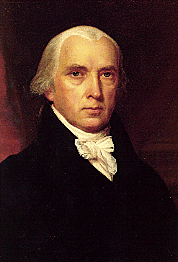Next step on my attempt to see if the past history of pre-Presidential experience can be a guide to what it takes to be president: James Madison.
I have to admit that while the first three presidents came easily to my tongue, I struggled to remember number four to no avail. I just haven’t used that information (which is somewhere in my head) recently, so could not access it. But, of course, four and five are the Jameses. I’m sure my experience is not unique among Americans.
 Like all of the initial presidents, he was one of the Founding Fathers.
Like all of the initial presidents, he was one of the Founding Fathers.
Born 1751 in Virginia, he served two terms from 1809-1817, and he died in 1836 (age 85) in Virginia.
Experience:
- born to tobacco plantation owners, the oldest of 12 children (7 living to adulthood)
- attended College of New Jersey, graduating in half the time, age 18-19
- studied with the college president for an additional year, age 20
- Virginia legislator, protege of Jefferson, age 25-29
- persuaded Virginia to cede claims of northwest territories (modern Ohio, Indiana, Illinois) to the Continental Congress, age 32
- drafted Virginia Plan, which became the basis of the 3-branch system of government, and the US Constitution, age 36
- authored 1/3 of the Federalist Papers, age 36-37
- orated for Virginia ratification of the Constitution, age 37
- US Representative for Virginia, age 37-45
- see-sawed on the Creation of the Bill of Rights, eventually authoring them, age 38
- organized Democratic-Republican party with Jefferson, age 42
- unsuccessfully opposed Alexander Hamilton’s Bank of the United States, funding of state and national debts, and the Jay Treaty, age 42-43
- married Dolly Todd, age 44
- Secretary of State for Jefferson, age 50-57
- tried to balance relations between waring Britain and France
- attempted an embargo against foreign nations – caused hardship for Southern ports
- oversaw purchase of Louisiana Territory
- party in the Supreme Court case Marbury v Madison
As president, Madison was the first president to have a vice president leave office. Both of his vice presidents died in office and were not replaced.
He left office at 65. He retired to Montpelier, his tobacco plantation in Virginia; his finances were in a failing state.
He became obsessed with his legacy, anxiety riddled over his finances, and was often in poor physical health because of it.
At 78 he helped Virginia redraft its state constitution.
He died at 85, ignored by the modern polity, the last remaining signatory of the US Constitution.